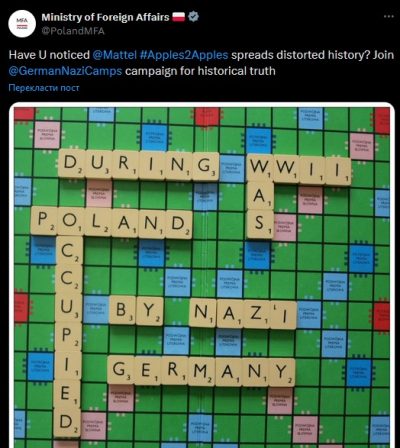In an unconventional form of protest, Poland’s Ministry of Foreign Affairs used Scrabble to call out toy giant Mattel for including the phrase “Nazi Poland” in one of its products.
The move was a response to concerns over the card game Apples to Apples, which featured a card stating that the film Schindler’s List, directed by Steven Spielberg, “tells the story of a Catholic businessman who saved 1,000 Jews from Nazi Poland.”
The issue was first brought to public attention by Nowy Dziennik, a Polish-language newspaper published in the United States, after being alerted by a reader. In April 2015, the publication commented: “The scandal caused by the head of the FBI accusing Poland of being complicit in the Holocaust hasn’t even died down, and now another case of slandering Poland comes to light. This time, the largest American toy manufacturer, Mattel, is teaching children about ‘Nazi Poland’ in an educational game.”

After being notified of the card by the newspaper, the Polish embassy in Washington promptly intervened. The Ministry of Foreign Affairs followed with an unconventional educational message posted on Twitter (now X), spelling out with Scrabble tiles: “During WWII Poland wasoccupied by Nazi Germany”. Mattel issued a swift response, clarifying that the phrase “Nazi Poland” had appeared in an older version of the game. “We discovered this inaccuracy back in 2013 and immediately removed this card from the game. We apologise for the gross oversight,” the company stated. Stephanie Cota Teitelbaum, a senior executive at Mattel at the time,
echoed the sentiment, saying, “We would like to apologise for this significant oversight.” Mattel’s CEO, Christopher Sinclair, later sent a formal letter of apology to Poland’s then-Ambassador to the U.S., Ryszard Schnepf. The company also offered to replace copies of the game that contained the misleading content.
In its coverage of the incident, the UK’s The Guardian included the following note for readers:
“Poland was occupied by Nazi Germany during the Second World War,
during which millions of its citizens died, many in death camps that
operated on Polish soil. The Polish government is actively concerned with
ensuring that the correct terminology is used by media worldwide when
reporting or referencing such events.”
Then-Foreign Minister Grzegorz Schetyna emphasised that Poland would not let such incidents go unanswered: “We will respond to every similar case.”
Government spokesperson Małgorzata Kidawa-Błońska added that the Polish Foreign Ministry and diplomatic services are becoming increasingly proactive in addressing historical inaccuracies: “We’ve always secured either a correction or an expression of regret,” she said. She also stressed: “It is crucial to inform, explain, and teach our history. This requires consistent, patient work and firm rejection of all falsehoods.”
Since 2004, the Polish Ministry of Foreign Affairs has routinely intervened whenever terms like “Polish concentration camps” appear in public discourse. Between 2011 and 2015 alone, 636 such interventions were recorded. Due to continued efforts by Polish diplomatic missions, the frequency of phrases such as “Polish death camps” in foreign media has steadily declined.
“Polish diplomacy intervenes every time someone uses the phrase ‘Polish camp’ in the context of Auschwitz,” said Foreign Minister
Radosław Sikorski in January 2025.
Complied by: ih

COMMENTS